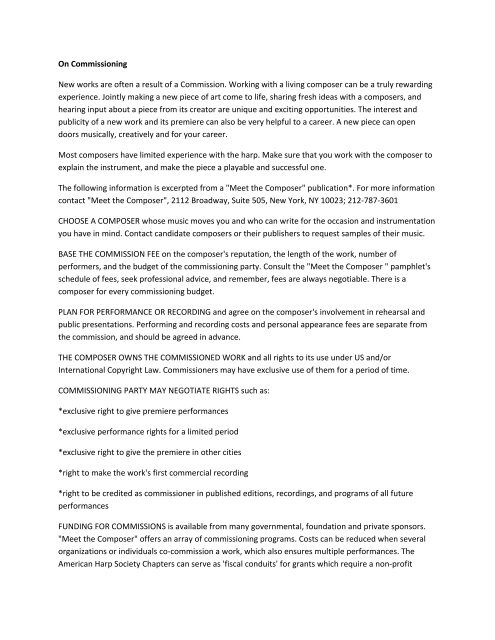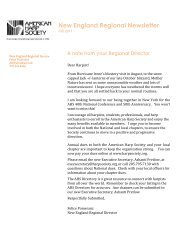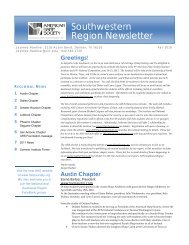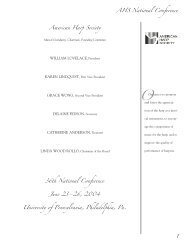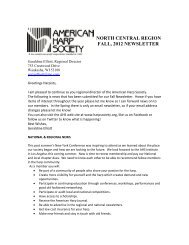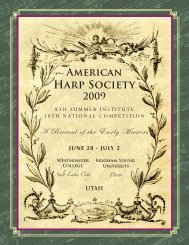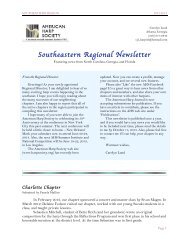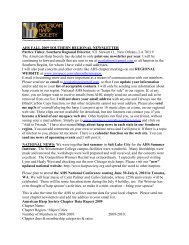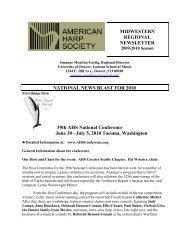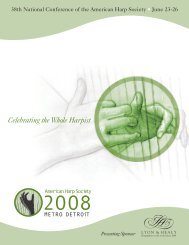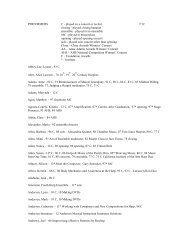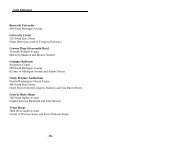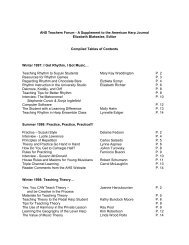On Commissioning - American Harp Society
On Commissioning - American Harp Society
On Commissioning - American Harp Society
Create successful ePaper yourself
Turn your PDF publications into a flip-book with our unique Google optimized e-Paper software.
<strong>On</strong> <strong>Commissioning</strong><br />
New works are often a result of a Commission. Working with a living composer can be a truly rewarding<br />
experience. Jointly making a new piece of art come to life, sharing fresh ideas with a composers, and<br />
hearing input about a piece from its creator are unique and exciting opportunities. The interest and<br />
publicity of a new work and its premiere can also be very helpful to a career. A new piece can open<br />
doors musically, creatively and for your career.<br />
Most composers have limited experience with the harp. Make sure that you work with the composer to<br />
explain the instrument, and make the piece a playable and successful one.<br />
The following information is excerpted from a "Meet the Composer" publication*. For more information<br />
contact "Meet the Composer", 2112 Broadway, Suite 505, New York, NY 10023; 212‐787‐3601<br />
CHOOSE A COMPOSER whose music moves you and who can write for the occasion and instrumentation<br />
you have in mind. Contact candidate composers or their publishers to request samples of their music.<br />
BASE THE COMMISSION FEE on the composer's reputation, the length of the work, number of<br />
performers, and the budget of the commissioning party. Consult the "Meet the Composer " pamphlet's<br />
schedule of fees, seek professional advice, and remember, fees are always negotiable. There is a<br />
composer for every commissioning budget.<br />
PLAN FOR PERFORMANCE OR RECORDING and agree on the composer's involvement in rehearsal and<br />
public presentations. Performing and recording costs and personal appearance fees are separate from<br />
the commission, and should be agreed in advance.<br />
THE COMPOSER OWNS THE COMMISSIONED WORK and all rights to its use under US and/or<br />
International Copyright Law. Commissioners may have exclusive use of them for a period of time.<br />
COMMISSIONING PARTY MAY NEGOTIATE RIGHTS such as:<br />
*exclusive right to give premiere performances<br />
*exclusive performance rights for a limited period<br />
*exclusive right to give the premiere in other cities<br />
*right to make the work's first commercial recording<br />
*right to be credited as commissioner in published editions, recordings, and programs of all future<br />
performances<br />
FUNDING FOR COMMISSIONS is available from many governmental, foundation and private sponsors.<br />
"Meet the Composer" offers an array of commissioning programs. Costs can be reduced when several<br />
organizations or individuals co‐commission a work, which also ensures multiple performances. The<br />
<strong>American</strong> <strong>Harp</strong> <strong>Society</strong> Chapters can serve as 'fiscal conduits' for grants which require a non‐profit
status. You will need a COMMISSIONING AGREEMENT between the commissioner and the composers.<br />
The pamphlet from MEET THE COMPOSER has great pointers on what should be included.<br />
*Excerpts from: "<strong>Commissioning</strong> Music, A Basic Guide" pamphlet ‐ Meet the Composers, Inc., 2112<br />
Broadway, Suite 505, New York, New York 10023<br />
For further information contact Sonja Inglefield at sonjaling@yahoo.com.


